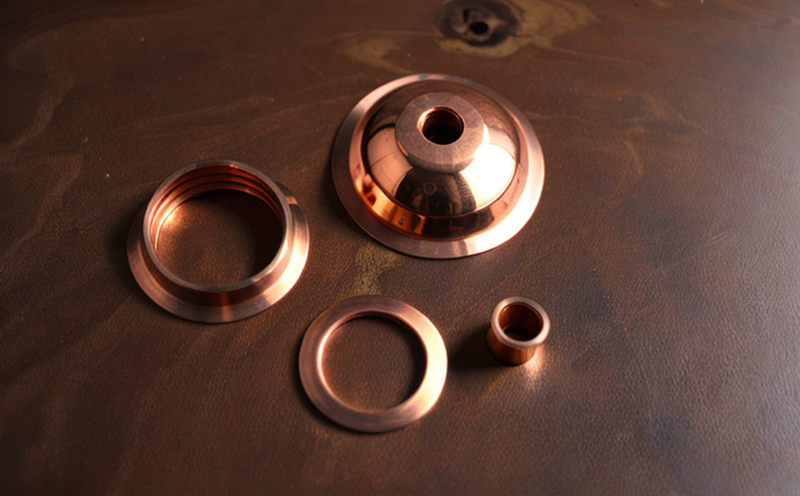RTCA DO-160 Section 4 Temperature and Altitude Simulation Testing
The RTCA DO-160 standard is a comprehensive set of guidelines designed to ensure that electronic equipment, components, and subassemblies used in aerospace and aviation meet stringent environmental requirements. Specifically, DO-160 Section 4 focuses on testing the performance of materials under extreme temperature and altitude conditions.
This section is particularly critical for copper and brass materials due to their widespread use in avionics systems, connectors, and electrical contacts within aircraft and spacecraft. Copper and brass are essential because they provide excellent electrical conductivity, corrosion resistance, and thermal stability—qualities that are paramount in the aerospace industry where durability and reliability are non-negotiable.
RTCA DO-160 Section 4 tests these materials by subjecting them to a range of temperatures and altitudes that simulate real-world conditions encountered during flight. The testing process involves exposure to high and low temperatures, changes in atmospheric pressure (altitude), humidity, and even vibration. These environmental stresses are designed to evaluate the material's integrity, performance, and longevity under severe operating conditions.
The testing protocol is meticulously detailed, specifying precise temperature ranges, duration of exposure, and pressure levels for each altitude condition. This ensures that the results are consistent and replicable across different laboratories and test environments. Compliance with these tests is essential for manufacturers to meet stringent aerospace standards and obtain certification from aviation authorities such as the FAA.
The importance of this testing cannot be overstated. In the case of copper and brass materials, failure under extreme conditions could lead to catastrophic failures in critical systems like communication links or power distribution networks. This makes RTCA DO-160 Section 4 a crucial step in ensuring that aerospace components are reliable and safe for use.
Our laboratory is equipped with state-of-the-art facilities capable of simulating these harsh environmental conditions. Our team of experts ensures that each test is conducted according to the latest standards, providing accurate and verifiable results. By choosing our services, you can be confident in the quality and reliability of your materials.
Why It Matters
The aerospace industry operates under some of the most demanding environmental conditions on Earth. Aircraft and spacecraft are exposed to extreme temperatures ranging from frigid cold to scorching heat, as well as varying altitudes that can exert immense pressure on materials. Copper and brass, being critical components in many avionics systems, must withstand these stresses without compromising performance.
Testing according to RTCA DO-160 Section 4 is not just a regulatory requirement; it's an essential step towards ensuring the safety and reliability of aerospace products. The tests simulate real-world conditions that materials will encounter during flight, allowing manufacturers to identify potential weaknesses early in the development process. This proactive approach helps prevent costly delays and failures once the product reaches operational use.
For quality managers and compliance officers, adhering to these standards ensures that their organization meets industry benchmarks and regulatory requirements. R&D engineers can leverage the insights gained from these tests to refine designs and improve material selection. Procurement professionals benefit by ensuring that they source materials that have been tested under rigorous conditions, thereby reducing risks associated with substandard components.
In summary, RTCA DO-160 Section 4 testing is crucial for maintaining the highest standards of quality and safety in aerospace applications. By investing in this testing process early on, organizations can build trust with customers and regulators while ensuring long-term reliability and performance of their products.
Customer Impact and Satisfaction
For our customers, compliance with RTCA DO-160 Section 4 is not just about meeting regulatory requirements—it's a commitment to delivering superior quality. By offering this service, we help our clients achieve several key benefits:
- Enhanced Reliability: Testing ensures that materials perform consistently under harsh conditions, reducing the risk of failures in critical systems.
- Improved Safety: Compliance with these standards helps prevent accidents and incidents caused by material failure during flight.
- Informed Decision-Making: The insights gained from testing provide valuable data for R&D teams to innovate and improve product designs.
- Better Reputation: By demonstrating adherence to strict industry standards, customers can build a reputation for quality and safety.
Our goal is to exceed customer expectations by providing accurate, reliable test results. We work closely with our clients to understand their specific needs and tailor the testing process accordingly. This collaborative approach ensures that we deliver solutions that meet not only regulatory requirements but also the unique challenges faced by each client.
The satisfaction of our customers is paramount, and we strive to ensure that every project meets or exceeds expectations. Through rigorous testing and meticulous analysis, we provide peace of mind knowing that your products are ready for any environmental challenge they might face in service.
Use Cases and Application Examples
- Aircraft Communication Systems: Testing ensures that copper and brass connectors maintain their integrity under extreme temperature and pressure changes, crucial for reliable communication during flight.
- Voltage Distribution Networks: Materials used in power distribution systems must withstand high temperatures to prevent overheating and potential fires.
- Avionics Panels: The electrical contacts within avionics panels need to be corrosion-resistant to ensure long-term reliability.
- Structural Components: While not directly related to copper or brass, the testing of these materials can impact the overall durability and performance of structural components by ensuring that fasteners and connectors are reliable.
In each case, our laboratory provides a comprehensive suite of services tailored to meet the specific needs of your project. From initial consultation through final reporting, we ensure that every aspect of the testing process is handled with precision and care.





